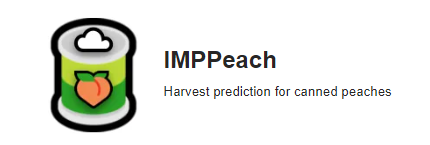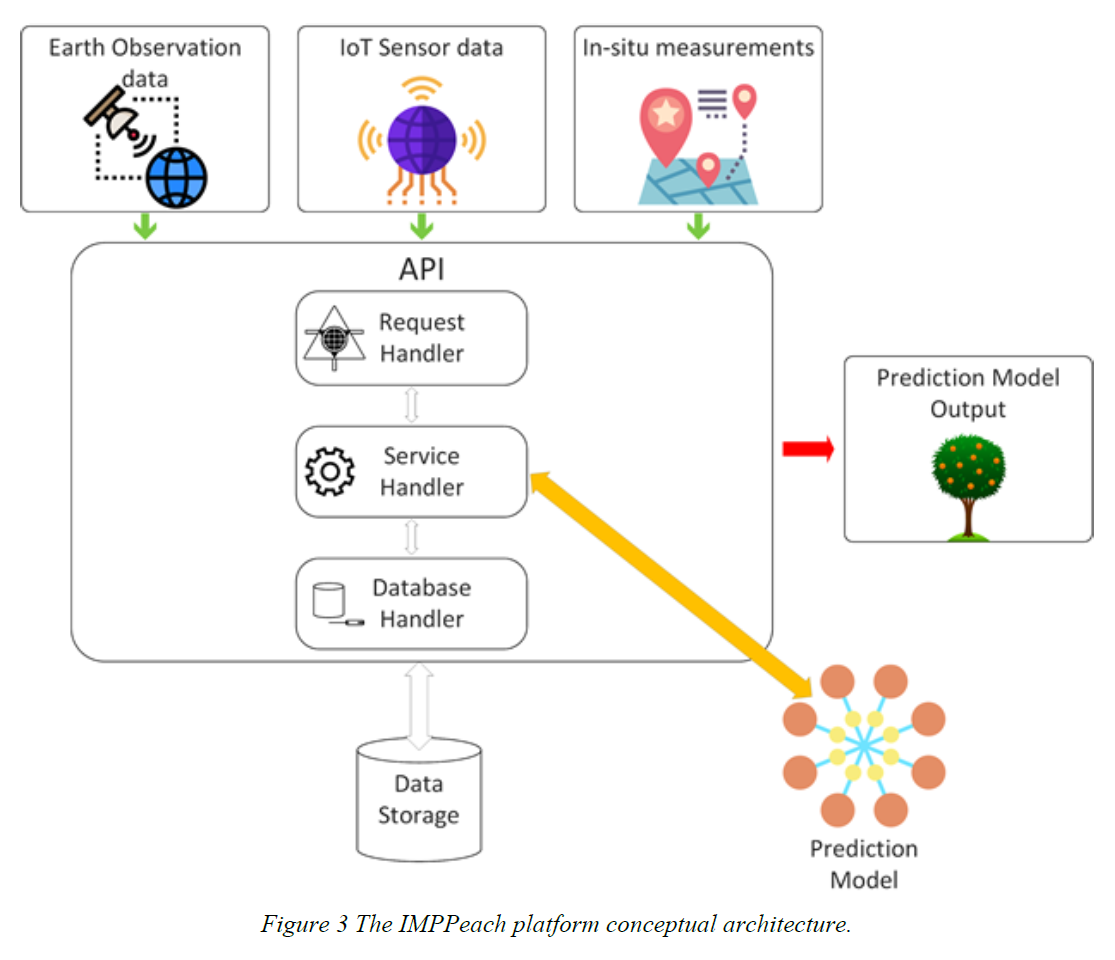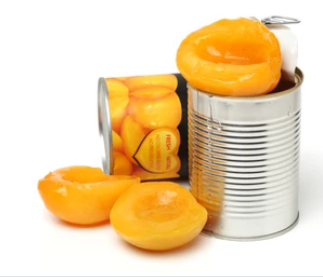
Introduction
The IMPPeach project's primary objective is to deliver accurate prediction of yields / quantities and harvest dates for optimum maturity of peach cultivations (canned peaches varieties) in order to optimize the production planning for canning facilities.
For any fruit canning business, improving the prediction accuracy of the fruit quantities and harvest dates is of critical importance to the production planning and execution. The benefits from improved harvest and yield prediction accuracy include a) increase in efficiency, b) added value for the products, c) gains in market share and d) increased profit margins. These benefits affect not only the canning business itself but are shared with all stakeholders including a larger number of smallholder farmers that typically are the fruit suppliers.
The project will study peach orchards in a part (approximately 100 km2) of the area of Imathia, (Central Macedonia, Greece), with a total area of ca. 1000 Ha, in more than 2000 separate fields cultivated by producers-members of 3 cooperatives (Aliakmon, Messi and Meliki) and supplying the canning facility of the project partner ALMME.
Historical records of peach deliveries to the canning facility (fields and varieties, yield quantities, harvest and delivery dates) for the last 5 years, will be combined with EO data/indices and climatic data of the same period to develop prediction models (statistical, AI/ML). Additional data (IoT and ground/site parameters) will be collected during the project period (3 cultivation years) from a sample of fields and will be used to augment/enhance/retrain and calibrate the models. The prediction models will be compared and evaluated against actual crop production data from the 3-year project period.
All the datasets used in the project will be integrated into a Farm Management Information System and the model predictions will be interfaced via the FMIS to the Material Requirements Planning software of the canning facility.
The project will implement an extensive dissemination, communication and exploitation plan, backed-up by major industry players, including a study on how the project results can be transferred to other crops and geographical locations and a market research for industries with similar business requirements.
Background
The fruit canning industry has to deal with the uncertainty in terms of harvest dates and yields. Production planning and satisfying customer and market demands is a challenge due to variations in fruits produce: harvest dates, fruit size and qualitative characteristics, and yielded quantities fluctuate from year to year due to continuous changes in the crop-soil-environment system: Different weather conditions, diseases, variations in farming practices and market dynamics are among the main reasons of the variability. For any fruit canning business, improving the prediction accuracy of the fruit quantities, harvest dates and characteristics is of critical importance to the production planning and execution. Benefits include increase in efficiency, added value for the products, gains in market share and increased profit margins. The benefits are shared by both the canning business and the farmers / fruit producers.
Main project activities
We aim to achieve these objectives by employing AI/ML, RS and IoT technologies and integrating them into a digital platform customized for the peach industry, that will provide:
- Digital geo-referenced records of cultivated fields along with historical crop-variety data: harvest dates, yield quantities etc.
- Historical and current RS (satellite) image time series of the fields and corresponding vegetation indexes to derive parameters like plant vitality, Chlorophyll content, water stress, leave pigments (e.g. NDVI, CIRE, NDW) as well as phenological parameters.
- Field data (climatic and soil conditions), cultivation data (e.g. irrigation) crop and fruit data (size, growth rate) through both an IoT sensor network and field scouting.
- A model that predicts the harvest dates and quantities based on the analysis by AI/ML algorithms of the collected data.
- A distributed FMIS that integrates all collected data, supports data exchange and communication between farmers and the fruit canning business and integrates the predictions with the MRP process.

Expected social impact
Increasing the profitability will generate higher sustainable income for farmers and more stable jobs in the factories. This will lead to more social security, improved living standards. In developing countries, it will also lead to better education and better healthcare. Cooperation among farmers will be fostered.
Implementation and plans to reach target groups
A key role for the exploitation of the results will play the strong linkage with farming partners and processors in that project. It is also not limited to Greece but reaches out to Europe and even globally. We have received letters of support from the Association of Greek canning industries (GCA), Staerea, a Spanish consulting company addressing the Spanish fruit producers and last but not least Landgard, a German marketing producer cooperative for flowers & plants and fruit & vegetables, with a turnover of 2 b €, pursuing a global procurement business. This demonstrates not only a strong interest in the project outcomes, but also enables us to set-up a strong outreach to farmers, processors and other stakeholders in Europe and globally.
IMPPeach recognizes an appropriate dissemination and exploitation strategy as the key success factor for the project’s sustainability allowing to maximize the impact of the project results. We will focus its strategy on these main elements:
- Identification of exploitable assets: Analysis of the project outcomes throughout the project lifetime will help to clarify which outcomes of the project are exploitable in joint or individual fashion.
- Market study and the insights generated by the use case implemented in this project, will help to identify the best-suited monetization model for the project outcomes.
- Business and sustainability plan, to ensure long-term success of project outcomes after the project, future evolution and maintenance of the project results and generate business opportunities for partners and communities.
- Collaboration with all farmers, producers, SMEs and other stakeholders involved in the supply chain to ensure maximum outreach and penetration of the project results in the relevant market segment by also receiving feed-back from the players.
Consortium
Coordinated by:
- Vangelis Vassiliadis - Agrostis SA, Greece
Partners:
- Florian Schlenz - Geocledian GmbH, Germany
- Javier Durante - Sigrow BV, The Netherlands
- Christos Stergiou - ALMME SA, Greece
- Dionissios Kalivas - Agricultural University of Athens, Greece
Funded by:
- General Secretariat for Research and Technology, Greece
- Bundesministerium für Bildung und Forschung, Germany
- Ministry of Agriculture, Nature and Food Quality, The Netherlands
Video
Introduction
The IMPPeach project's primary objective is to deliver accurate prediction of yields / quantities and harvest dates for optimum maturity of peach cultivations (canned peaches varieties) in order to optimize the production planning for canning facilities.
For any fruit canning business, improving the prediction accuracy of the fruit quantities and harvest dates is of critical importance to the production planning and execution. The benefits from improved harvest and yield prediction accuracy include a) increase in efficiency, b) added value for the products, c) gains in market share and d) increased profit margins. These benefits affect not only the canning business itself but are shared with all stakeholders including a larger number of smallholder farmers that typically are the fruit suppliers.
The project will study peach orchards in a part (approximately 100 km2) of the area of Imathia, (Central Macedonia, Greece), with a total area of ca. 1000 Ha, in more than 2000 separate fields cultivated by producers-members of 3 cooperatives (Aliakmon, Messi and Meliki) and supplying the canning facility of the project partner ALMME.
Historical records of peach deliveries to the canning facility (fields and varieties, yield quantities, harvest and delivery dates) for the last 5 years, will be combined with EO data/indices and climatic data of the same period to develop prediction models (statistical, AI/ML). Additional data (IoT and ground/site parameters) will be collected during the project period (3 cultivation years) from a sample of fields and will be used to augment/enhance/retrain and calibrate the models. The prediction models will be compared and evaluated against actual crop production data from the 3-year project period.
All the datasets used in the project will be integrated into a Farm Management Information System and the model predictions will be interfaced via the FMIS to the Material Requirements Planning software of the canning facility.
The project will implement an extensive dissemination, communication and exploitation plan, backed-up by major industry players, including a study on how the project results can be transferred to other crops and geographical locations and a market research for industries with similar business requirements.
Background
The fruit canning industry has to deal with the uncertainty in terms of harvest dates and yields. Production planning and satisfying customer and market demands is a challenge due to variations in fruits produce: harvest dates, fruit size and qualitative characteristics, and yielded quantities fluctuate from year to year due to continuous changes in the crop-soil-environment system: Different weather conditions, diseases, variations in farming practices and market dynamics are among the main reasons of the variability. For any fruit canning business, improving the prediction accuracy of the fruit quantities, harvest dates and characteristics is of critical importance to the production planning and execution. Benefits include increase in efficiency, added value for the products, gains in market share and increased profit margins. The benefits are shared by both the canning business and the farmers / fruit producers.
Main project activities
We aim to achieve these objectives by employing AI/ML, RS and IoT technologies and integrating them into a digital platform customized for the peach industry, that will provide:
Expected social impact
Increasing the profitability will generate higher sustainable income for farmers and more stable jobs in the factories. This will lead to more social security, improved living standards. In developing countries, it will also lead to better education and better healthcare. Cooperation among farmers will be fostered.
Implementation and plans to reach target groups
A key role for the exploitation of the results will play the strong linkage with farming partners and processors in that project. It is also not limited to Greece but reaches out to Europe and even globally. We have received letters of support from the Association of Greek canning industries (GCA), Staerea, a Spanish consulting company addressing the Spanish fruit producers and last but not least Landgard, a German marketing producer cooperative for flowers & plants and fruit & vegetables, with a turnover of 2 b €, pursuing a global procurement business. This demonstrates not only a strong interest in the project outcomes, but also enables us to set-up a strong outreach to farmers, processors and other stakeholders in Europe and globally.
IMPPeach recognizes an appropriate dissemination and exploitation strategy as the key success factor for the project’s sustainability allowing to maximize the impact of the project results. We will focus its strategy on these main elements:
Consortium
Coordinated by:
Partners:
Funded by:
Video